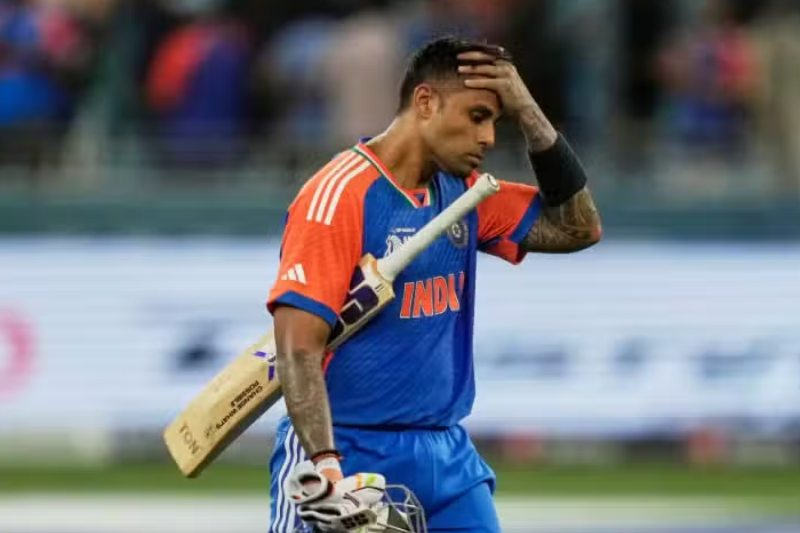The 2025 Asia Cup has been a tournament full of drama, not only on the field but also off it. As cricket fans across South Asia gear up for the much-anticipated final between India and Pakistan, the International Cricket Council (ICC) has found itself at the center of a controversy that reflects the intensity of one of the sport’s fiercest rivalries.
On September 14, following India’s group-stage victory over Pakistan, Indian captain Suryakumar Yadav made remarks that have now led to official sanctions. His post-match comments, which linked the win to India’s armed forces and referenced a recent border skirmish, were deemed a breach of the ICC Code of Conduct. The decision to punish Yadav highlights cricket’s ongoing struggle to keep politics away from the game, particularly when it involves nations with a volatile political history like India and Pakistan.
ICC’s Action Against Suryakumar Yadav
Match referee Richie Richardson rejected Yadav’s not-guilty plea, concluding that his words carried political undertones in violation of ICC rules. While the exact punishment has not been publicly disclosed, sources close to the matter suggest that Yadav may face demerit points on his disciplinary record and a potential fine.
The ruling also prompted the Board of Control for Cricket in India (BCCI) to launch an appeal. Indian officials argue that Yadav’s remarks were misinterpreted and intended as a motivational message for his team, not a political statement. The appeal process will likely extend beyond the Asia Cup, but for now, the sanction serves as a reminder that even star players are not immune to ICC regulations.
Why the Remarks Sparked Controversy
The ICC has consistently prohibited players from making political or humanitarian statements on the field of play or in official post-match interactions. Yadav’s dedication of India’s win to the armed forces was immediately seen as a violation of this principle, especially since it came against the backdrop of recent India-Pakistan military tensions.
The Pakistan Cricket Board (PCB) lodged a formal complaint within hours, demanding a Level 4 sanction the most serious penalty under ICC’s code. Their case cited past examples, including the ICC’s ban on visible messaging by players, such as when Usman Khawaja attempted to highlight the Gaza crisis in 2024 by wearing shoes inscribed with the phrase, “Freedom is a human right.” The ICC blocked that action, reinforcing its stance that cricket should remain separate from political or social activism.
Pakistan Players Also Under Scrutiny
Interestingly, Suryakumar Yadav is not the only cricketer facing disciplinary scrutiny during this tournament. Pakistan’s Sahibzada Farhan and Haris Rauf have also come under the spotlight after their actions in the Super Four clash on September 21.
Farhan celebrated his half-century with a gun-shooting gesture, while Rauf was caught on camera mimicking the act of bringing down an aircraft a move that many interpreted as a pointed reference to India’s military history. Although both players have pleaded not guilty, insisting their gestures were spontaneous and not politically motivated, the ICC has taken notice.
Privately, the PCB concedes that fines could be handed down, even if harsher penalties are avoided. Both incidents underline how the charged atmosphere of Indo-Pak cricket matches often spills beyond the sport itself.
Rising Political Tension in the Asia Cup
The Asia Cup has long been a stage where India-Pakistan matches transcend sport, but this year’s edition has been marked by especially visible hostility. Reports of India’s refusal to engage in customary pre- and post-match handshakes, along with heated verbal exchanges during the Super Four contest, have added to the animosity.
The latest sanctions only heighten the already intense build-up to the final showdown. With disciplinary cases hanging over star players from both camps, the cricketing spectacle has become intertwined with national pride and political sensitivity.
What the Sanction Means for Suryakumar Yadav
For Suryakumar Yadav, the ICC’s action is a significant moment in his career as India’s captain. While his leadership on the field has been praised, this episode has raised questions about discipline and the thin line between patriotism and politicization in international sport. If demerit points are confirmed, they could impact his eligibility in future ICC events if further infractions occur.
The controversy also places pressure on the BCCI, which must balance defending its captain with respecting ICC authority. Should the appeal fail, it may lead to greater calls for Indian players to exercise caution in their public remarks.
Cricket and the Ban on Political Messaging
The ICC’s handling of this case reaffirms its policy of keeping politics out of cricket. From banning armbands with political slogans to blocking symbolic gestures on equipment, the governing body has been firm in preventing the game from becoming a platform for political expression.
However, critics argue that enforcing these rules is complicated when national identity is deeply embedded in cricket rivalries. In the case of India and Pakistan, cricket often mirrors diplomatic relations, making it difficult for players to separate sporting passion from political sentiment.
Also read this: Asia Cup Final: Salman Ali Agha Backs Pakistan Over India
Asia Cup 2025 Final
As the Asia Cup 2025 heads into its grand finale between India and Pakistan, the atmosphere is more charged than ever. On one hand, fans anticipate a cricketing classic. On the other, disciplinary clouds loom over both teams.
-
India’s captain Suryakumar Yadav faces sanction for his remarks.
-
Pakistan’s Sahibzada Farhan and Haris Rauf risk fines for their controversial celebrations.
-
The ICC is under pressure to enforce rules consistently without appearing biased.
Whatever the outcomes of these cases, the tournament has once again highlighted how Indo-Pak cricket is rarely just about bat and ball. For millions of fans, it is about pride, politics, and passion making every gesture, word, and win a matter of national importance.


1 thought on “Suryakumar Yadav Faces ICC Sanctions Over Political Statement”